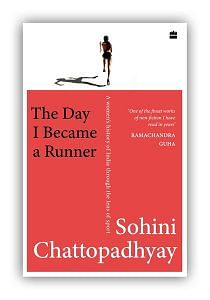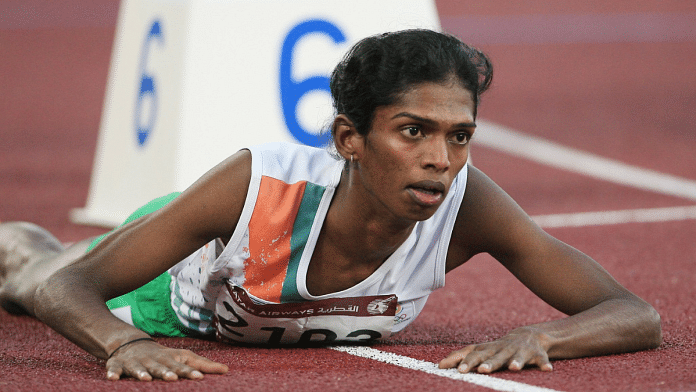At the finishing line, Santhi pushed her torso forward as Snesarev had taught them all to. Physical sensation returned too—her lungs, calves, shins and stomach burnt, everything inside her chest and stomach cavity seared viciously, the result of her body blazing through the oxygen available and then running on an empty tank, melting glucose in the body to fuel movement. Yet, she also felt a fistful of warm thrill opening slowly within. She had fulfilled that scribble in her diary. She knew she had got her medal, although she did not know yet if it was silver as she had hoped for, or a bronze. Jamal was gold, of course—she was a full stride ahead. But the Kazakh athlete Viktoriya Yalovtseva, who had recorded the fastest time across all three heats the previous evening, had drawn up elbow by elbow
with her.
Dizzy with exhaustion and relief, she lay on her stomach for a few moments. Ahead was the giant digital scoreboard that flashed the results. At 02:03.16, she was second after all, ahead of Yalovtseva by three-hundredths of a second. Jamal had clocked in at 2 minutes, 1.79 seconds. This is the moment captured by the photograph that is used most often in the press in India—Santhi Soundarajan on the ground, intently reading the results, the moment of vindication for the decade and more of training that had brought her to this moment.
Half an hour later, she was on the podium in her India tracksuit, holding up her medal for the photograph with Jamal and Yalovtseva, and cradling a bouquet of yellow flowers. A decade and a half later when I met her, a photograph of that moment stood on a cement shelf in her tiny, sky-blue living room in Trichy. The silver Asian Games medal is still kept carefully in a locker at her home in Kathakurichi village 50 km from Tiruchirappalli. Although the medal was withdrawn from her in 2006 and awarded to Yalovtseva, it was never physically taken back. Only her name was removed from the official records of the Asian Games and the World Athletics.
The day after she received the medal at Doha, an official from the Indian contingent summoned Santhi for tests. But he did not reveal the reason she was being tested. First, he took a blood test, and then asked her to undress. As Santhi lay undressed on an examination table, four other persons entered the room. The Indian official was the only one she was familiar with, and he left the room soon after the others came in without introducing her to them. Her English-language skills were non-existent at the time, and none of these persons spoke Tamil, her mother tongue. She guessed they were doctors, because they spent the next several minutes examining her body and probing her orifices with rubber-gloved fingers.
How does it feel to lie naked and alone with four strangers who speak a language you don’t understand, who touch you, examine your body, point to it, discuss you, but make no attempt to speak or communicate with you? Santhi felt both a dead weight within her and a great distance from herself, as if she were attending her own post-mortem but they didn’t know she was still there, still alive, watching all of it. The only communication they made with her was a gesture that she should get up and leave. She dressed in silence and left. When she saw the clock outside, she realized she had been there for less than thirty minutes. She did not know it then, but she would never stop revisiting those thirty minutes. Without warning, the room, those rubbery hands, that desolation still return to Santhi, filling sweltering afternoons and enervating training sessions with cold dread.
No one from the Indian contingent came to inform Santhi about the result of the examination, or even why she had been called for the test. Instead, she was handed a flight ticket back to India for the same day, while the rest of her long-distance team stayed back. At home in Kathakurichi, visitors poured into her family home every day to congratulate her and see her silver medal. One of those evenings, in a house filled with neighbours and others, she saw her face on the news with the headline that she had been ‘stripped’ of her Asian Games medal because she had failed the ‘gender test’. Another evening soon after, or perhaps it was the same one—time had congealed into a ball of anxiety by then—the secretary general of the Athletics Federation of India called her at home and informed her that they would not allow her to compete any further. Her sports career was over.
To date, Santhi told me, neither the Indian government nor the Athletics Federation of India has given her the results of the examination in Doha, and the grounds on which she ‘failed’. It was like failing an exam where she did not know the syllabus, understand the questions or shown the mistakes she had made. Or rather, the ‘mistakes’ she was made of.
Only the Tamil Nadu state government made a gesture of support. They decided to award her a cheque for Rs 15 lakh, honouring her as the first Tamilian to win a silver at the Asian Games. Santhi would use a large part of this money to train children from her village and the neighbouring villages in athletics and field events. A couple of years later, when this money had been spent, she took up a private contractual job that paid her Rs 7,000 a month, before she quit it to work in a brick kiln. Brickwork paid more—Rs 9,000 a month.
Perhaps it also reminded her less of what she had lost. Today, no video record of the 800-metre final in the 2006 Asian Games is accessible from India. In fact, no video evidence of Santhi’s athletics career is available in India any longer. You can never see Santhi in motion, never know if she ran tautly or loose-limbed, how wide her stride was, if she turned her face instinctively skywards at the end of a race or bent down towards the ground to decelerate.
Athletes speak with their bodies, in kinesis. World Athletics and the Government of India took away her right to compete and, what’s more, every recorded memory of her in action. As if someone wanted to erase every memory of Santhi Soundarajan, the athlete who won twelve international medals for India. What remains are the news stories, the photographs, the online archive of her competitions and times, and her own private memories.
 This excerpt from Sohini Chattopadhyay’s ‘The Day I Became a Runner’ has been published with permission from Harper Collins.
This excerpt from Sohini Chattopadhyay’s ‘The Day I Became a Runner’ has been published with permission from Harper Collins.



